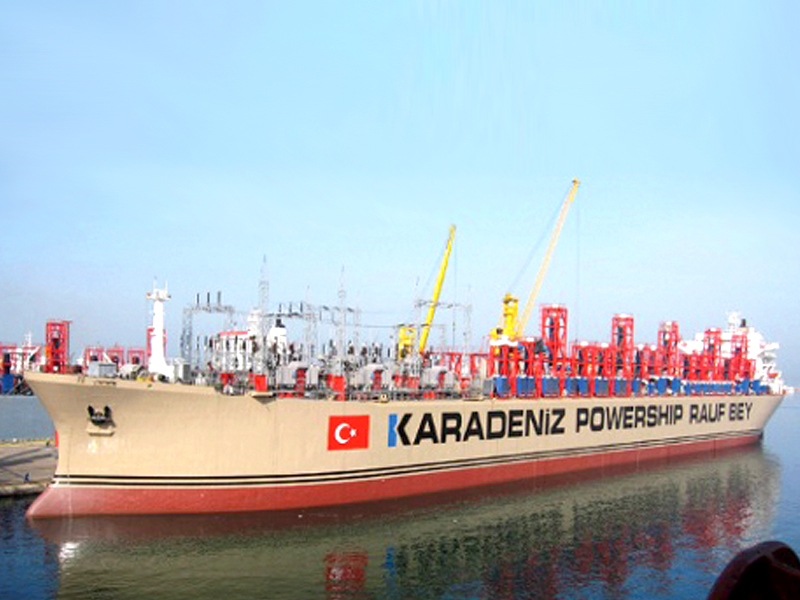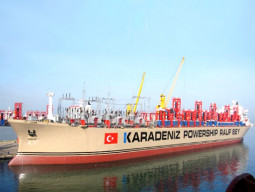
ISLAMABAD: International Centre for Settlement of Investment Disputes (ICSID) has ordered immediate release of Karadeniz Power ship Kaya Bey detained in Pakistani waters since April, 2012.
In a statement issued here, the leading Turkish energy company, Karkey Karadeniz ElektrikUretim A.S. (Karkey), welcomed the decision on its Request for Provisional Measures by the tribunal established under the World Bank-affiliated International Centre for Settlement of Investment Disputes (ICSID) on October 16, 2013.
In this decision, the tribunal ruled that it is satisfied pursuant to Article 25(1) of the ICSID Convention that it has prima facie jurisdiction, and has ordered the immediate release of Karadeniz Power ship Kaya Bey (Karkey’s largest Powership and one of four Karkey vessels that has been detained in Pakistani waters since April, 2012).
Following a hearing on October 8, 2013, the ICSID tribunal ruled that Karkey’s Karadeniz Powership Kaya Bey registered under the Turkish flag should be immediately released from detention and allowed to sail to Dubai for repairs.
In the decision, the tribunal stated that the State of Pakistan shall grant all authorizations and clearance required for the vessel’s departure, and shall take any other action necessary or required to allow the vessel to depart lawfully into international waters.
A Karkey spokesperson said: “The decision by the ICSID tribunal to order the release of one of our powerships vindicates the position taken by Karkey that the tribunal clearly has jurisdiction under the Turkey-Pakistan Bilateral Investment Treaty (“BIT”), and that recourse to Pakistani courts is not mandatory under the BIT. This is especially important since Karkey has opted to enforce its rights and remedies at ICSID due to lack of fair and equitable treatment and due to denial of justice in Pakistan.”
The spokesperson also stated: “In light of the decision, a new opportunity has arisen for Pakistan to amicably settle the dispute, especially considering the findings therein regarding the jurisdiction of the tribunal and ICSID.”
Karkey is seeking compensation from Pakistan for breach of Pakistan’s obligations under the BIT in connection with Karkey’s investment in a rental power project (RPP) in Karachi, as well as for loss of earnings and costs associated with Pakistan’s detention of its ship. The dispute has reached the highest levels of government and was discussed during the recent visit to Turkey of Nawaz Sharif, Pakistan’s prime minister.
The company spokesperson said: “Increased economic cooperation between Turkey and Pakistan is in both countries’ best interest. This unnecessary dispute has clouded the climate for bilateral cooperation and damaged investor and business confidence. We hope it can be settled quickly and fairly, preventing it from becoming an obstacle to successful future Turkish collaboration with the Government of Pakistan in the energy and other sectors.”
Published in The Express Tribune, October 22nd, 2013.
Like Business on Facebook, follow @TribuneBiz on Twitter to stay informed and join in the conversation.
COMMENTS (19)
Comments are moderated and generally will be posted if they are on-topic and not abusive.
For more information, please see our Comments FAQ


































































I think the Pakistani government should assist Karkey to do its job. In fact, they should invite more. All business is affected badly from blackouts
As a Turkish citizen who has lived in Pakistan for many years, I am sure both countries will settle this as quickly as possible but from what I’ve heard from my friends in Pakistan, they need electricity for their business
@Ali: The fault will lie with the minister as he has overall responsibility for fair execution. If he himself is corrupt, others' have a reason to comply with his wishes. Minster will get the blame ! On top of high electricity costs, now Pakistan will also have to pay the damages which it will be made to pay, if not very openly, behind the scenes. These damages will be payed using borrowed money from IMF. Is anybody even governing in Pakistan? Does any one have any sense of responsibility in Pakistan? Has any Minister in last 20 years done anything to benefit Pakistan? Would Pakistan would not be better without its government, Jamaat Parties and its Army/ISI because these entities are eating away at the insides of Pakistan like termites?
LOCAL Law pervails!!!! so long ICSID:P
Okay so your minister was corrupt and that therefore gives you the right to sieze a foreign ship? How can people do business with Pakistan if the nation is corrupt and its courts may seize your assets for doing business with the country?
The CJP should issue contempt of court notice to the judge of the international court.
The ship has been detained on the orders of Pakistani court which says that the ship is a part of a mega corruption scandal by then minister for water & power Raja Parvez Ashraf with the involvement of the owners of the ship. The court also blames the owners of the ship for violation in the original agreement.
Let the SC pay the compensation
So..what was the reason of all this? Capture the one who wanted to help?
@Blithe We are a weak country surviving on American aid. Look how we talk to others!
Turkey is a respected country with international standing.
What are our next options? Take it to OIC?
SC foiled PPP plans to buy electricity at the astounding rate of Rs 35 per unit, then do 'favor' to public by giving subsidy. SC was right to cancel the deal. Now it should also hold PPP accountable for any damages claimed by the Turkish company.
@Blithe: don't worry your leaders friendship with the Turks is deeper than the deepest ocean and sweet as honey
a nation of cheats.
And praise be to PPP who did these absurd IPP deals and then masked them under subsidies , so no one could figure out the mess!
I don't like the implied threat.
"We hope it can be settled quickly and fairly, preventing it from becoming an obstacle to successful future Turkish collaboration with the Government of Pakistan in the energy and other sectors.”
Similar to Reko Diq - Pakistan courts have been overruled by International arbitration - more support for why international investors require contractual clauses demanding arbitration as they don't trust Pakistani justice. In both cases it's likely that Pakistan is going to face huge damage claims.
The requirement of professional journalism is while writing a report or making a story, the writer/editor must also mention the reason as what was the reason that the ship was arrested in Pakistan Waters?
ET would you please find out and upload the corrected version of this news item.